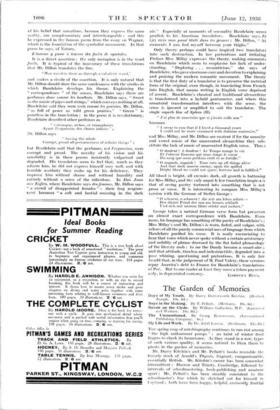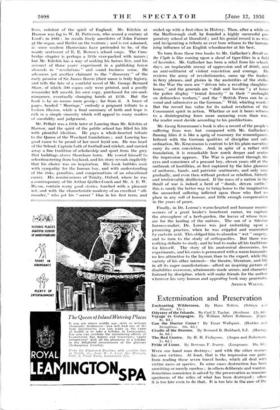The Garden of Memories
Boys in the Making. By T. Pellaft. (Methuen. 10s. 6d.) Revolt on the Clyde. By William Gallacher, M.P. (Lawrence and Wishart. 10s. 6d.) The Unmentioned. By Georg Kruezmann. (International Publishing Company. Gs.) My Life and Work. By Dr. Adolf Lorenz. (Scribners. 12s. 6d.)
Tin: spring crop of autobiography continues to. run riot among " the high midsummer pornps " : no taint of winter frost lingers to check its luxuriance. As they stand in a row, types of such various quality, it seems natural to liken them to plants in the garden of memories.
Mr. Darcy Kitchin's and Mr. Pellaft a books resemble the
homely stock of Arnold's Thyrsis, fragrant, companionable, essentially British. Mr. Kitchin's career has been somewhat intermittent ; Harrow and Trinity, Cambridge, followed by intervals of schoolmastering, book-publishing and amateur sport ; Mr. Pellatt's has been steadily consistent to the schoolmaster's line which he sketched out for himself in 1 a■ hood ; both have been happy, helpful, eminently fruitful lives, redolent of the spirit of England. Mr. Kitchin at Harrow was fag to W. It Patterson, who scored* century at Lord's in =1881 ; he recalls lively anecdotes of 'John Farmer at the organ, and Butler on the rostrum ; and is not ashamed, as Some modern Harrovians hive pretended to be, of the manly sentiment of E. E. Bovren's school songs. The Cam- bridge chapter is perhaps a little over-packed with names ; but Mr. Kitchin has a way of making his heroes live, and his account of three years' experiment in a publishing house abounds in " revelations " and sound business sense. He advances yet another claimant to the " discovery " of the early promise of Sir James Barrie (their name is truly legion), and tells the fate of a youthful novel of Mr. George Bernard Shaw. of which 500 copies only were printed, and a goodly remainder left unsold, his own copy, purchased for one-and- ninepence, eventually changing hands at £150. But the book is by no means mere gossip ; far from it. A brace of pages, headed " Marriage," embody a poignant tribute to a broken illusion, while a final summary of faith and hope is rich in * simple sincerity which will appeal to many readers of sensibility and judgement.
Mr. Pellatt was a little later at Lancing than Mr. Kitchin at Harrow, and the spirit of the public school has filled his life with plentiful idealism. He pays a whole-hearted tribute to the Queen of the Woodard foundations ; and Lancing has good cause to be proud of her most loyal son. He was head of the School, Captain both of football and cricket, and carried away *fine tradition of scholarship and silort from the grey flint buildings above Shoreham town. He vowed himself to schoolmastering from boyhood, and his story reveals implicitly that his choice was an inspiration. His book bubbles over with sympathy for the human boy, and with understanding of the risks, penalties, and compensations of an educational career. His reminiscences of Trinity, Oxford, where he was a contemporary of Sir Arthur Quiller-Couch and Mr. A. E. W. Macon, contain many good stories, touched with a pleasant wit, and with the characteristic modesty of an excellent "all- rounder," who got his " soccer " blue in his first term, and
ended up with a first-class in History. Then, after a while On the Marlborough staff, lie founded a highly successful pre- paratory school at Durnfrad.; -Eind.his genial record is as wise and invigorating a tribute as ever bore witness to the human- ising influence of an English schoolmaster at his best.
To turn from these two books to Mr. Gallacher's Revolt on the Clyde is like coming upon a sheaf of tiger-lilies in a field of lavender. Mr. Gallacher has been a rebel from his school-
days, an implacable enemy of oppression and of drink, and an anti-militarist of violent conviction and courage. He reviews the army of revolutionaries, sums up the leaders in fiery phrases, and glories in the austerities of the strike. In the War the men are " driven into a revolting slaughter- house," and the generals are " dull and bovine " ; at home the police display brutal ferocity " in their " onslatight on defenceless workers," and the " British Press can be as venal and submissive as the German." Wild, whirling words ! But the record has value for its naked revelation of the Communist spirit in action. Whether or not it bears witness to a disintegrating force more menacing even than war, the reader must decide according to his predilections.
Mr. Georg Kruezmann's book is also a record of the people's suffering from war, but compared with Mr. Gallacher's flaming lilies it is like a sprig of rosemary for remembrance. Infused with the German qualities of discipline and sub- ordination, Mr. Kruezmann is content to let his plain narrative carry its own conviction. And; in spite of a rather stiff translation, it is remarkable how mach deeper and acuter the impression appears. The War is presented through the eyes and conscience of a peasant boy, eleven years old at .the outbreak of hostilities, at first captured by the false glamour of uniforms, bands, and patriotic sentiments, and only very gradually, and even then without protest or rebellion, bitterly and irretrievably disillusioned. If the mass of a nation in the thrall of war is indeed a herd of " dumb, driven cattle.- this is surely the better way to bring home to the imagination the unmerited suffering inflicted upon those who find no place in any roll of honour, and little enough compensation in the years of peace.
Finally, in Dr. Lorenz's warm-hearted and humane remini- scences of a great healer's beneficent career, we capture the. atmosphere of a herb-garden, the leaves of whose trees are for the healing of the nations. • The son of a SileSian harness-maker, Dr. Lorenz was -just- embarking upon a promising practice, when he was crippled and macerated by carbolic acid. This obliged him to abandon " wet " surgery, and to turn to the study of orthopaedics. But there was nothing definite to study, and he had to make all his tradition for . himself. The story. of his anatomical discoveries, - his experiments, and his cures is permeated with a warm humanity no less attractive to the layman than to the expert, while the variety of his other interests—the theatre, literature, and life in all its eager manifestations—afford an inspiring picture of disabilities overcome," attainments made secure, and character fostered by discipline, which will make friends for the author wherever his very human and appealing book may penetrate.
ARTHUR W+CGH.























































 Previous page
Previous page